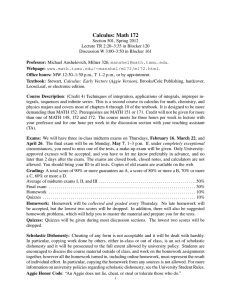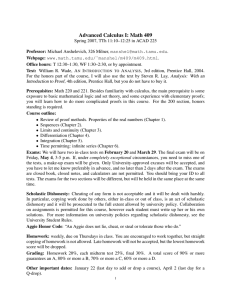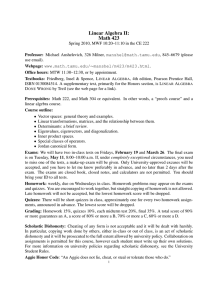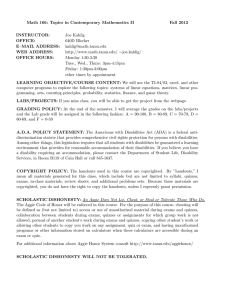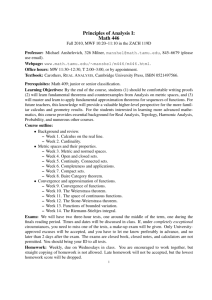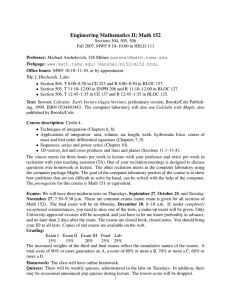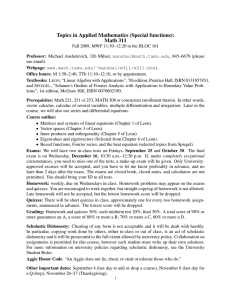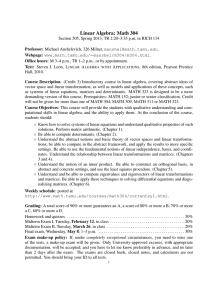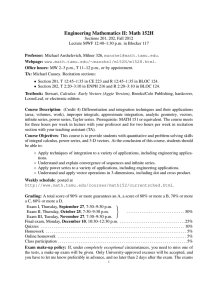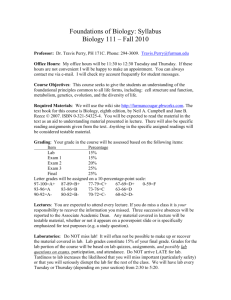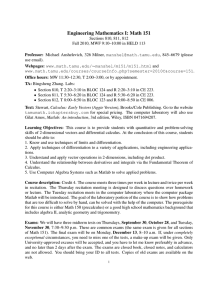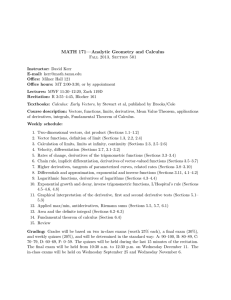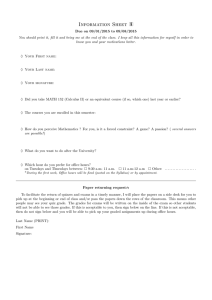Engineering Mathematics III: Math 251
advertisement
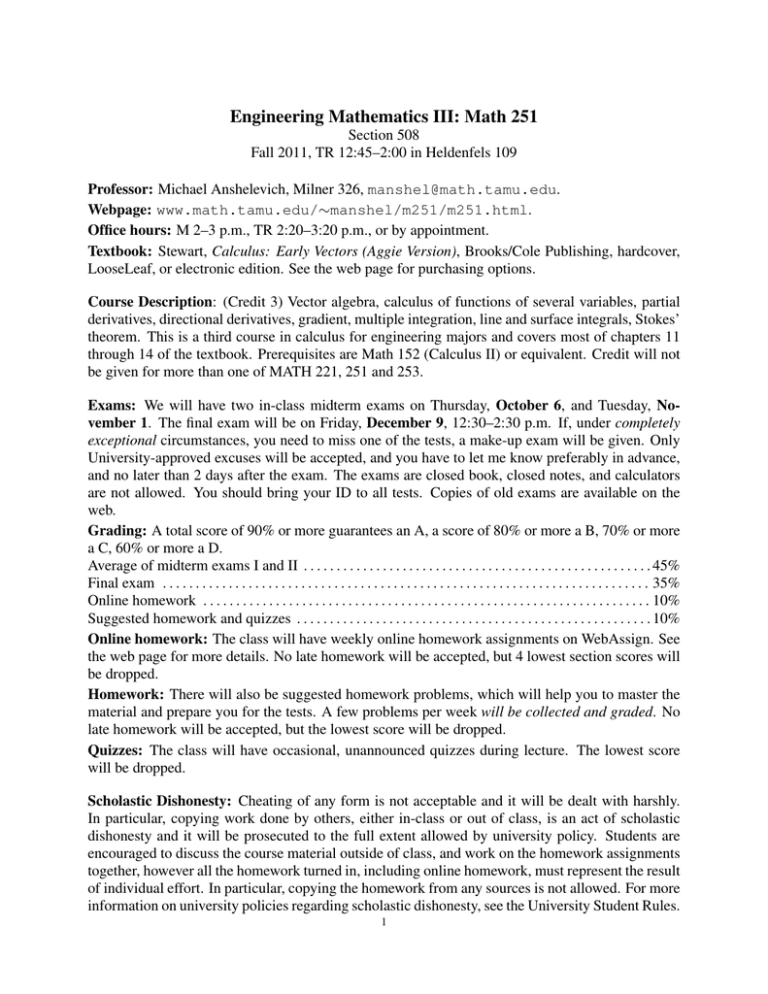
Engineering Mathematics III: Math 251 Section 508 Fall 2011, TR 12:45–2:00 in Heldenfels 109 Professor: Michael Anshelevich, Milner 326, manshel@math.tamu.edu. Webpage: www.math.tamu.edu/∼manshel/m251/m251.html. Office hours: M 2–3 p.m., TR 2:20–3:20 p.m., or by appointment. Textbook: Stewart, Calculus: Early Vectors (Aggie Version), Brooks/Cole Publishing, hardcover, LooseLeaf, or electronic edition. See the web page for purchasing options. Course Description: (Credit 3) Vector algebra, calculus of functions of several variables, partial derivatives, directional derivatives, gradient, multiple integration, line and surface integrals, Stokes’ theorem. This is a third course in calculus for engineering majors and covers most of chapters 11 through 14 of the textbook. Prerequisites are Math 152 (Calculus II) or equivalent. Credit will not be given for more than one of MATH 221, 251 and 253. Exams: We will have two in-class midterm exams on Thursday, October 6, and Tuesday, November 1. The final exam will be on Friday, December 9, 12:30–2:30 p.m. If, under completely exceptional circumstances, you need to miss one of the tests, a make-up exam will be given. Only University-approved excuses will be accepted, and you have to let me know preferably in advance, and no later than 2 days after the exam. The exams are closed book, closed notes, and calculators are not allowed. You should bring your ID to all tests. Copies of old exams are available on the web. Grading: A total score of 90% or more guarantees an A, a score of 80% or more a B, 70% or more a C, 60% or more a D. Average of midterm exams I and II . . . . . . . . . . . . . . . . . . . . . . . . . . . . . . . . . . . . . . . . . . . . . . . . . . . . . 45% Final exam . . . . . . . . . . . . . . . . . . . . . . . . . . . . . . . . . . . . . . . . . . . . . . . . . . . . . . . . . . . . . . . . . . . . . . . . . . 35% Online homework . . . . . . . . . . . . . . . . . . . . . . . . . . . . . . . . . . . . . . . . . . . . . . . . . . . . . . . . . . . . . . . . . . . . 10% Suggested homework and quizzes . . . . . . . . . . . . . . . . . . . . . . . . . . . . . . . . . . . . . . . . . . . . . . . . . . . . . . 10% Online homework: The class will have weekly online homework assignments on WebAssign. See the web page for more details. No late homework will be accepted, but 4 lowest section scores will be dropped. Homework: There will also be suggested homework problems, which will help you to master the material and prepare you for the tests. A few problems per week will be collected and graded. No late homework will be accepted, but the lowest score will be dropped. Quizzes: The class will have occasional, unannounced quizzes during lecture. The lowest score will be dropped. Scholastic Dishonesty: Cheating of any form is not acceptable and it will be dealt with harshly. In particular, copying work done by others, either in-class or out of class, is an act of scholastic dishonesty and it will be prosecuted to the full extent allowed by university policy. Students are encouraged to discuss the course material outside of class, and work on the homework assignments together, however all the homework turned in, including online homework, must represent the result of individual effort. In particular, copying the homework from any sources is not allowed. For more information on university policies regarding scholastic dishonesty, see the University Student Rules. 1 Aggie Honor Code: “An Aggie does not lie, cheat, or steal or tolerate those who do.” Students with disabilities: Come talk to me no later than the first week of classes. “The Americans with Disabilities Act (ADA) is a federal anti-discrimination statute that provides comprehensive civil rights protection for persons with disabilities. Among other things, this legislation requires that all students with disabilities be guaranteed a learning environment that provides for reasonable accommodation of their disabilities. If you believe that you have a disability requiring an accommodation, please contact the Department of Student Life, Services for Students with Disabilities, in Room 126 of the Koldus Building or call 845–1637.” Attendance: According to the University Student Rules, absence for three or more class days requires a University-approved excuse and documentation. Course topics: • Three-dimensional analytic geometry and vectors (Chapter 11). ◦ Lines. Surfaces. Vector functions. • Partial derivatives (Chapter 12). ◦ Partial derivatives. Gradient vector. Lagrange multipliers. • Multiple integrals (Chapter 13). ◦ Double and triple integrals. Integration in polar, cylindrical, and spherical coordinates. • Vector calculus (Chapter 14). ◦ Line and surface integrals. Green’s, Stokes, and Divergence theorems. Weekly schedule: (approximate, subject to adjustment) Week 1: 11.1-11.4, 11.5. Week 6: 13.1, 13.2, E1. Week 2: 11.5, 11.6, 12.1. Week 7: 13.3, 13.4. Week 3: 12.3, 12.4. Week 8: 13.5, 13.6, 13.8. Week 4: 12.5, 12.6. Week 9: 13.9, 13.10, 13.11. Week 5: 12.7, 12.8. Week 10: E2, 14.1. Week 11: Week 12: Week 13: Week 14: Week 15: 14.2, 14.3. 14.4, 14.5. 14.6, Th. 14.7, 14.8. 14.9. Other important dates: September 2 (last day to add or drop a course), November 4 (Q-drop), November 24–25 (Thanksgiving), December 6 (last day of classes). Keys to success: Attend class (of course :) Solve all the homework problems, well before the exams. Spend more than seven hours per week working on the problems. Form study groups to discuss the course material and homework problems. Read ahead in the text. All printed handouts and web-materials are protected by US Copyright Laws. No multiple copies can be made without written permission by the instructor.
